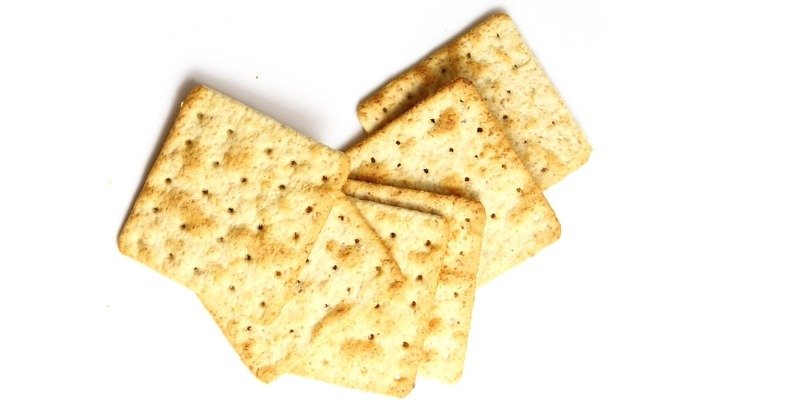Crackers are a cornerstone for the barbecue season, and you are often tempted to allow your canine companion to enjoy a few too! But since that treat is high in carbs, sugar, and sodium, it’s probably better to avoid human crackers in the long term.
Are you interested in a particular topic about crackers and dogs? Then use the table of contents below to jump to the most relevant section. And you can always go back by clicking on the black arrow in the right bottom corner of the page. Also, please note that some of the links in this article may be affiliate links. For more details, check the Disclosure section at the bottom of the page.
Here's what we'll cover:
Are crackers bad for dogs?
The answer will not surprise you: whereas your dog won’t go dead after gulping a few crackers, it’s not advisable to give this snack to your pup regularly. Their nutritional value is meager. But those are high in calories, nasty preservatives, salt, and fat. While your dog may enjoy these prohibited ingredients, those won’t do good to a four-legged friend.

Can dogs eat Saltines?
The dog shouldn’t eat saltines. A saltine or soda cracker is a very thin cracker, most often made of white flour, baking soda, and yeast. And of course, it’s generously sprinkled with coarse salt. It has holes over its surface and amazing crisp texture. It has 941 mg of Sodium per 100g. Which is more than ten times more than daily recommended sodium intake for an average-sized dog.

And we know that salt is usually deemed toxic for most house-trained animals, including dogs. Whenever possible, it’s much better to ditch high sodium foods from your pups menu altogether. If you do let your dog have some Saltine crackers watch for salt poisoning signs. But I am sure both you and your pet will find better things to do if no Saltines crackers would be terminated.
You might also like:
- How to Get FREE Dog Food? Tips for Claiming the Samples You Want
- Terrific Gift Ideas for Dog Owners: From Dog Art to Pup’s Twin
- Top 7 Dog Nail Grinders: Best Professional, Quietest, & More

How many calories in a soda cracker?
According to the U.S. Department of Agriculture, Agricultural Research Service and their FoodData Central database, 100g serving of soda (saltine) crackers contains 418 calories, 9.46g of protein, 74.05g of carbs, and 8.64g of fat.

Can dogs eat Ritz crackers?
As with any other crackers – a couple of Ritz Crackers most likely won’t hurt your dog. Yet, Ritz crackers contain a combination of bad fats, carbs and high levels of sodium that may affect your dog long-term if eaten regularly and in sufficient quantities (e.g., more than 10% of daily calories intake).
One serving (16g) of Original Ritz Crackers has 80 calories, and half of it comes from fat. Too much for a little treat. A dog’s diet is usually fatty, but most of the fat they require comes from specifically designed dog food. Treats like Ritz crackers add extra fat to your dog’s nutrition, which can end in pancreatitis. This disease is characterized by swelling of the pancreas and can be very unpleasant for your pooch.
Of course, you can consider low-fat crackers to avoid the risk of pancreatitis, but still, a human-size portion Ritz crackers (five crackers) contains 135 mg of sodium. And that’s 35% that daily recommended intake for a dog of average size (around 30 pounds).

If you still have doubts it’s always a good idea to visit your vet for consultation, when you are about to introduce new food to your dog’s diet. Or, in case you want to save money and time while being efficient in answering ANY question related to your pup health, you might check online vets for immediate support of highly qualified vets.

Can dogs eat animal crackers?
Even though the idea of sharing with your pup a cracker shaped like a dog, it might not be the best snack for your pet.
According to the U.S. Department of Agriculture, Agricultural Research Service, and their database FoodData Central, 100g serving of animal crackers contains 433 calories, 6.67g of protein, 70g of carbs, including 3.3g of fiber and 13.33g of fat.
On top of that, it has a tiny bit of nutrients – e.g. 2.4mg of Iron. But it’s still loaded with sugars (20g) and Sodium (414mg, which is way TOO HIGH for your pup). So although animal crackers are not toxic and won’t do too much harm, it’s not healthy either.

You might also like:
- Best Dog Housebreaking Sprays and How Do They Work (Or Not)?
- Best Dog Paw Cleaner (DIY Softest Paw Balm Recipe Included)
- Dog Subscription Box Option Under $10. Read Full Guide
Are crackers good for dogs?
Crackers aren’t necessarily good for dogs. They can be loaded with sugar, fats and sodium. And none of it do any service to your pup’s health. If we are talking about 1 low sodium cracker every now and then, your pet is going to be ok. However, if your four-legged friend is really into crunchy feel of crackers we’d suggest to consider switching to . These are designed with your pet’s nutritional needs in mind and could be quite healthy.

Best dog crackers: safe and crunchy choice
Instead of crackers, quality dog treats will be made specifically for dogs and have attributes that contribute to good health. For instance this quite cracker-ish treat: baked classic wafers by . They feel like cookie/crackers but made with all-natural ingredients, has a decent amount of proteins and low on carbs compared to crackers (12 calories per treat). And created with a sensitive pup’s stomachs in mind.

Can dogs eat crackers? Summary
While it may be amusing to throw your pup a cracker once in a while, it’s not the best treat choice. Dog’s treats, even though those suppose to be delicious and accepted to be less healthy, have to stay as nutritious and balanced as regular food for dogs.
A great idea to avoid the appeal of giving your dog beloved human food is to have low-calorie nutritions dog snacks around. And, according to current Association of American Feed Control Officials (AAFCO) standards, don’t let those treats make more than 10% of your pup’s daily diet.
Credits: thanks for the cover photo to Tafilah Yusof from Pixabay


